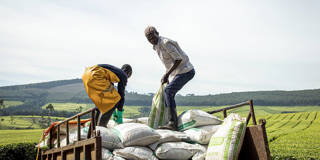 PATRICK MEINHARDT/AFP via Getty Images
PATRICK MEINHARDT/AFP via Getty Images
粮食安全就是国家安全
开罗—尽管拥有世界上 60% 的未开垦耕地,但非洲几十年来一直是粮食净进口。 根据最新估计,粮食进口是许多非洲国家最大的预算项目。 在粮食价格飙升和美元升值的情况下,非洲的粮食账单也一飞冲天,破坏了非洲国家的经济增长、债务可持续性和政治稳定。
https://prosyn.org/8Judddazh
To continue reading, register now. It’s free!
Register Now
Already have an account?
Log in



开罗—尽管拥有世界上 60% 的未开垦耕地,但非洲几十年来一直是粮食净进口。 根据最新估计,粮食进口是许多非洲国家最大的预算项目。 在粮食价格飙升和美元升值的情况下,非洲的粮食账单也一飞冲天,破坏了非洲国家的经济增长、债务可持续性和政治稳定。